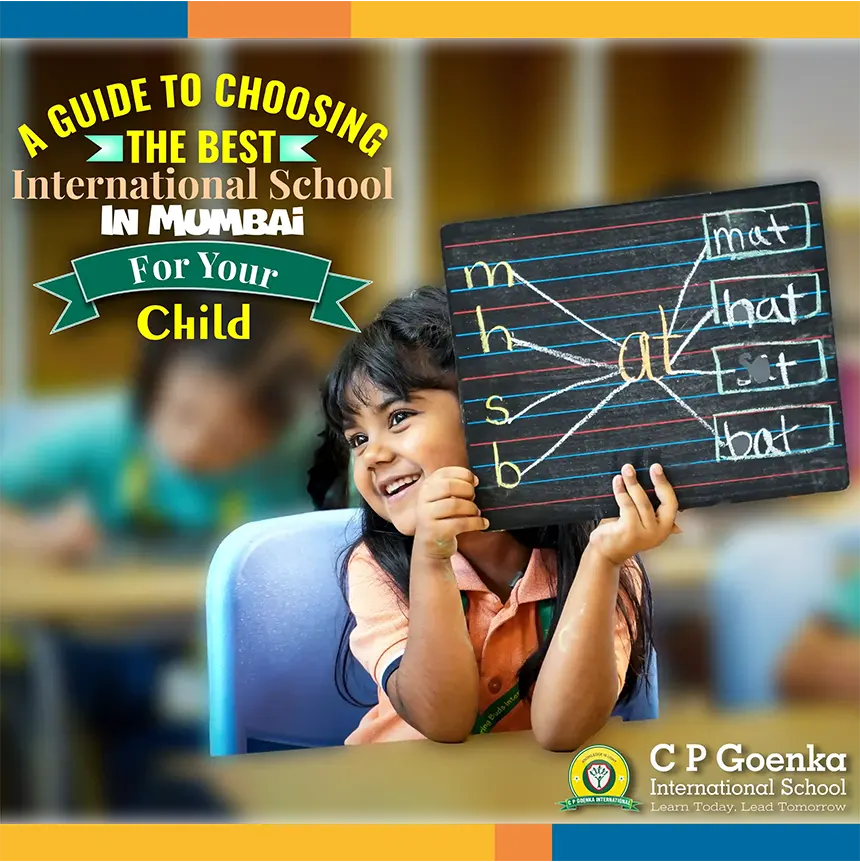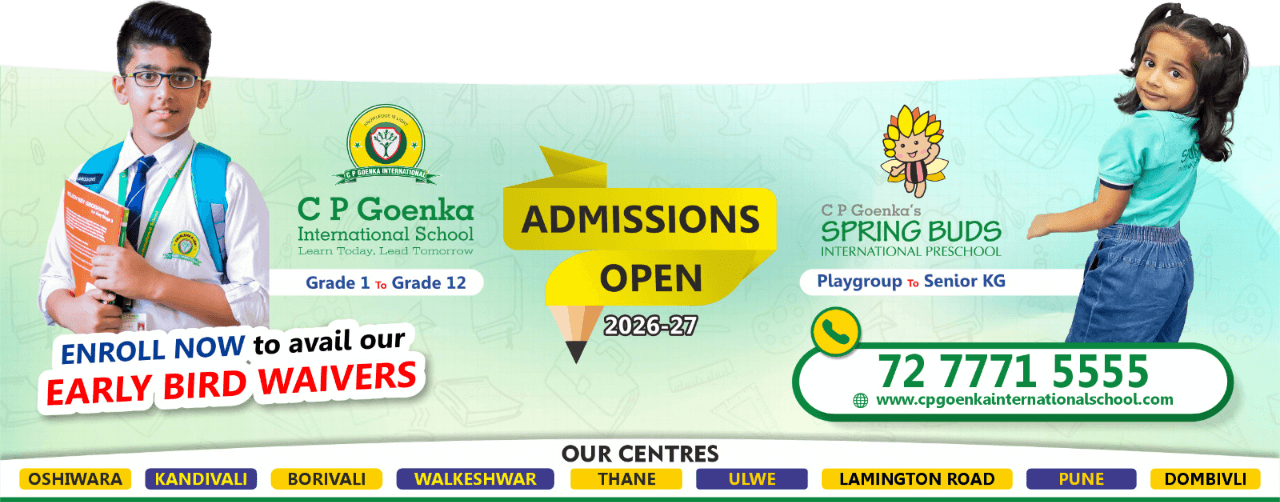
To Top
A Guide to Choosing the best international school in Mumbai for your child
Choosing the perfect international school in Mumbai for your child can be thrilling. With so many options available, exploring different aspects ensures finding a school that best suits your child's learning needs and interests. It's like finding a special place where your child can grow and learn happily. This article will explore key factors to consider when choosing an international school in Mumbai.

Understanding International Schools in Mumbai
International schools in Mumbai are educational institutions that cater to a diverse student body, often embracing global perspectives in their teaching approach. These schools offer a range of curricula beyond traditional local frameworks, emphasising a broader worldview and cultural diversity.
They aim to provide an inclusive environment for students from various cultural backgrounds, preparing them for a globally interconnected world. An international school in Mumbai typically prioritises holistic learning, encouraging academic excellence and the development of skills like critical thinking, creativity, and social awareness.
Key Factors to Consider
When exploring the best IGCSE schools in Mumbai, several crucial factors should guide your decision-making process:
- 1. Curriculum Diversity: International schools offer a spectrum of curricula, each with its unique approach. Assessing how these programs resonate with your child's learning style and aspirations is vital. Some focus on broad-based learning and nurturing critical thinking, while others emphasise structured assessment methods.
- 2. Teaching Methodologies: Understanding the teaching methods employed by different schools is essential. Some prioritise hands-on learning, encouraging exploration and experimentation, while others rely on traditional teaching styles. Finding a school aligning with your child's preferred learning approach enhances their educational experience.
- 3. Facilities and Extracurriculars: A school's buildings and activities outside regular classes greatly help a child's growth. Find schools with many different things to do, like sports, arts, clubs, and programs with the community. Assessing facilities like libraries, labs, and sports amenities is also crucial.
- 4. Location and Convenience: The school's proximity and commuting feasibility are practical considerations. Assess transportation options and how they fit into your family's daily routine. A convenient location can positively impact your child's overall well-being and timely attendance.
- 5. Embracing Diversity: Best schools in Mumbai pride themselves on diversity. Ensure the school fosters an inclusive environment that celebrates cultural diversity. A nurturing and accepting environment allows children from various backgrounds to thrive and learn from one another.
- 6. Parental Involvement: Consider the level of parental involvement encouraged by the school. Some schools actively engage parents through regular updates, events, or volunteering opportunities, fostering a strong home-school partnership.
- 7. Support Services: Assess the availability of support services, such as counselling, special education programs, or language support, if your child requires additional assistance or guidance.
- 8. Philosophy and Values: Understanding the school's educational philosophy and values is crucial. This helps ensure your child's moral and ethical development aligns with the school's ethos.
Taking the time to evaluate these aspects thoroughly and perhaps scheduling meetings with school staff or attending open houses will provide deeper insights into the school's environment, helping you make an informed decision about the best schools in Mumbai for your child.
The Types of Top International Schools in Mumbai
Several schools stand out for their commitment to excellence in education and overall development:
- Schools Prioritising Holistic Development:
Schools prioritising holistic development focus on nurturing various aspects of a child's growth beyond academics. Here's what they typically encompass:
- 1. Emotional Well-being: These schools pay attention to emotional intelligence, offering counselling services, supportive environments, and programs that help children understand and manage emotions effectively.
- 2. Physical Development: They emphasise physical activities, sports, and health education to ensure a child's physical well-being. This could involve sports facilities, health education, and extracurricular activities promoting physical fitness.
- 3. Social Skills: Schools fostering holistic development encourage social interaction, teamwork, leadership skills, and empathy. They often organise group activities, projects, and collaborative learning experiences to build strong interpersonal skills.
- Schools Emphasising Innovative Teaching Methods:
Schools emphasising innovative teaching methods go beyond traditional approaches to engage students dynamically and interactively. Key characteristics include:
- 1. Experiential Learning: They prioritise hands-on experiences, experiments, and real-life applications of knowledge, allowing students to learn by doing rather than simply memorising facts.
- 2. Technology Integration: These schools leverage technology as a tool for learning, incorporating multimedia, educational apps, and interactive platforms to enhance the learning experience.
- 3. Project-Based Learning: They encourage projects that involve research, problem-solving, and critical thinking, enabling students to delve deeper into subjects and develop practical skills.
- 4. Collaborative Learning: Group projects, discussions, and peer-to-peer learning are often encouraged to foster teamwork and communication skills among students.
- ● Schools Offering a Balanced Curriculum:
Schools aiming for a balanced curriculum ensure a comprehensive educational experience by addressing various facets of learning:
- Academic Rigour: They keep the learning bar high and have many different subjects so students can learn about many things, not just one.
- Extracurricular Activities: The best schools in Mumbai have many things to do after classes, like sports, art, clubs, and helping the community. That way, students can find what they like outside of regular schoolwork.
- Life Skills Development: They include lessons on life skills in what they teach, like how to handle money, manage time, and think carefully about things.
- Assessment and Evaluation: They employ various assessment methods beyond exams, including project-based assessments, presentations, and portfolios, to evaluate a student's overall development.
Choosing the Right Fit
When making the final decision, conducting thorough research, visiting campuses, and connecting with school representatives is crucial. Booking school tours allows you to enter the environment, meet teachers, and grasp the school's values. Interacting firsthand helps you understand if it's the right place for your child's educational journey.
Making the final decision also includes talking to current parents, attending open house events, and observing classroom dynamics. Conversations with teachers and school staff aid in understanding how they nurture students' growth and learning. It's about gathering all the information possible to ensure a confident and informed choice for your child's educational future.
Conclusion
Choosing the best international school in Mumbai involves a thoughtful evaluation of curriculum, teaching methods, facilities, and cultural inclusivity. Make sure to think about what your kid needs most when choosing a school. Look for one that helps them grow in all areas and prepares them for a good school experience. Every child is different, so picking the right school helps them do well in their studies, make friends, and feel good, setting them up for a great future.











